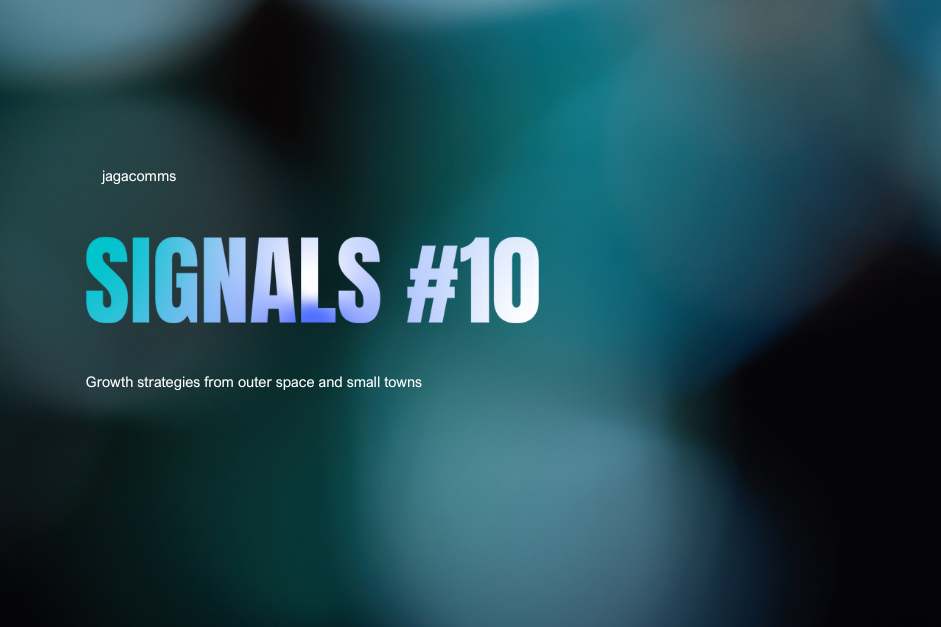Signals by jagacomms – Issue #10
Want to Scale? Do What Walmart Did in 1962
Story
In 1962, Sam Walton opened a small discount store in rural Arkansas. Instead of going after big cities, he focused on places other retailers ignored. He cut costs by skipping middlemen and building his own supply chain. Over time, this strategy helped Walmart grow into a $600 billion giant — not by being flashy, but by being ruthlessly efficient.
Why it worked
– They focused on customers others overlooked
– They built their own systems instead of relying on others
– They kept prices low and scaled with discipline
Takeaway for your brand
Winning doesn’t always mean being trendy
Serving a forgotten audience — and doing it better than anyone else — can fuel massive growth
Your biggest advantage might not be your product, but how you deliver it
In 1962, Sam Walton opened a small discount store in rural Arkansas. Instead of going after big cities, he focused on places other retailers ignored. He cut costs by skipping middlemen and building his own supply chain. Over time, this strategy helped Walmart grow into a $600 billion giant — not by being flashy, but by being ruthlessly efficient.
Why it worked
– They focused on customers others overlooked
– They built their own systems instead of relying on others
– They kept prices low and scaled with discipline
Takeaway for your brand
Winning doesn’t always mean being trendy
Serving a forgotten audience — and doing it better than anyone else — can fuel massive growth
Your biggest advantage might not be your product, but how you deliver it
How Airbnb Hacked Growth Without Ads
Story
In its early days, Airbnb struggled to reach people. So in 2008–2010, they built a tool to let hosts post their Airbnb listing straight to Craigslist with one click—automatically creating a Craigslist ad that linked back to Airbnb. This didn’t cost them a penny in advertising—but it brought in tons of traffic and bookings fast .
Why it worked
– They tapped into an existing audience — Airbnb hosts already used Craigslist to list rentals .
– It required no marketing budget: just clever engineering .
– Each cross-post created self-reinforcing growth — more hosts, more listings, more traffic .
Takeaway for your brand
Plug into platforms your users already use — don’t build an audience from scratch.
Engineered growth beats flashy ads — design your service to spread itself.
Simple tools can drive big results — often the easiest trick is the most powerful.
In its early days, Airbnb struggled to reach people. So in 2008–2010, they built a tool to let hosts post their Airbnb listing straight to Craigslist with one click—automatically creating a Craigslist ad that linked back to Airbnb. This didn’t cost them a penny in advertising—but it brought in tons of traffic and bookings fast .
Why it worked
– They tapped into an existing audience — Airbnb hosts already used Craigslist to list rentals .
– It required no marketing budget: just clever engineering .
– Each cross-post created self-reinforcing growth — more hosts, more listings, more traffic .
Takeaway for your brand
Plug into platforms your users already use — don’t build an audience from scratch.
Engineered growth beats flashy ads — design your service to spread itself.
Simple tools can drive big results — often the easiest trick is the most powerful.
Startup of the Week
What if your backups weren’t just off-site — but off-planet?
Lonestar Data Holdings is building data centers on the Moon. Their goal: provide ultra-secure, lunar-based data storage and disaster recovery infrastructure, protected from cyberattacks, natural disasters, and global instability.
Why it matters
The lunar environment offers long-term stability and physical isolation
Demand for secure data storage is growing in both public and private sectors
Lonestar is backed by ~$10 million in funding and early space partnerships
Learn more here!
Lonestar Data Holdings is building data centers on the Moon. Their goal: provide ultra-secure, lunar-based data storage and disaster recovery infrastructure, protected from cyberattacks, natural disasters, and global instability.
Why it matters
The lunar environment offers long-term stability and physical isolation
Demand for secure data storage is growing in both public and private sectors
Lonestar is backed by ~$10 million in funding and early space partnerships
Learn more here!

